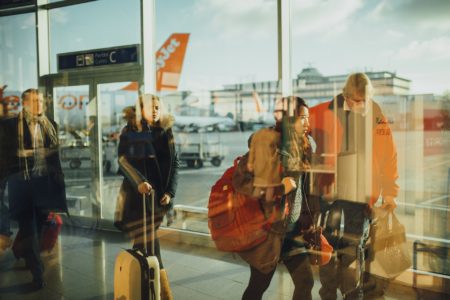Don’t panic, and carry a towel: sustainable aviation
 Source: Pixabay
Source: Pixabay
We don’t have to turn the clock back on flying – we have to move forward on innovation
In recent months, Greta Thunberg and schoolchildren across the world have led a striking – in both senses of the word – campaign to raise awareness and spark action on climate change. Her 14-day journey across the sea from England to New York to attend a UN climate summit was particularly impressive. Although she stated that it was not something everyone should do, it was hard not to be reminded of pre-aviation days where it took several days to cross the Atlantic and you could only go if you were wealthy.
What we have today are far shorter journey times and far more access to travel for less wealthy people. I got an email from Vueling yesterday offering me an €45 round trip from Bilbao to Seville, and I’m on their mailing lists because I was able to fly with them from Bilbao to Malaga back when I was earning €700 a month as an English Language Assistant. More recently, my friend and I once went from Paris Orly to Porto for €56 return: that was within our reach even as poor students. Beyond European internal flights, passenger numbers are also growing rapidly in Asia-Pacific, Africa, and the Middle East. The International Air Transport Association (IATA) figures also show that restrictive measures would slow, but not stop such growth in passenger numbers.
Having provided people with these opportunities, it would be unfair and unworkable to try to close them off again. Clearly, however, the climate impacts of business as usual are also unsustainable. What, then, can be done? A September event in Brussels set out to discuss a ‘Sustainable Pathway to Future Aviation.’ One of the keynote speakers, Professor Max Hirsh, set out the options for advancing sustainable aviation.
Part of his argument can be found on his personal website, but to summarise:
- EU-wide aviation taxes would damage national carriers the most, displace traffic outside of the EU and enable populist parties to accuse the EU of taking summer holidays away from the poor.
- We need to change how we design aircraft and how we design fuel, but the demand and the technology are not yet in place.
- Airports need to be seamlessly connected to high speed rail so people can easily combine the two.
- Airport terminals must be redesigned, possibly including complete refurbishment. Many of them were built with poor insulation and low quality materials, before energy efficiency was a priority. They also often rely on car parks to make money and need alternative revenue sources. He cited the example of Singapore Changi’s ‘Jewel’ which replaced its central car park with improved check-in services alongside additional retail and entertainment space.
- How people get to airports is a huge contributor to emissions, and innovative urban planning and transport solutions can help fix that.
- We need to have an honest public conversation about what practical changes can realistically be made, to convince airports and airlines to prioritise sustainability, and to make upfront public investments in projects that need coordinating across sectors.
From Brussels to Brussels – A Case Study
What particularly resonated with me was the issue of onward connections. Right now, in Europe, there are certain journeys where the economic incentive is to fly because the green option is eye-wateringly expensive. I recently booked my travel from Brussels back to the UK for Christmas. On my return, I’m planning to stop off and see my dad. There are two ways to do this: fly from Aberdeen to Birmingham and have someone collect me at the airport or get the train from Aberdeen to Peterborough and have someone collect me at the station.
The cost of the flight – plus the cost of a train to London and the Eurostar back to Brussels – was less than the cost of that one train from the north-east of Scotland to the south of England. Is it any wonder people continue to take internal flights?
According to Professor Hirsh, there are technological ways to keep flying, but these are just beginning to develop and face barriers such as insufficient demand, technical hurdles, and sunk investments in current aircraft. Governments can assist by putting public funds into research on these fledgling technologies. The EU has recently released a proposal for a European Partnership for Clean Aviation, designed to create a pact between the EU institutions and all other public and private stakeholders. The reasoning is that at the EU level, far more resources are available for truly revolutionary investment in new green technologies than a single company or country could provide. Although it’s the weird and wonderful designs that go viral, the EU proposal mentions the kind of electric ‘air taxis’ that have been a staple of sci-fi for decades and are now finally on the verge of becoming reality.
That is the problem in a nutshell: passenger growth is an unavoidable reality, but as yet, technological improvements might not keep up. IATA figures show that fuel burn can only be reduced by around 30-35% on current aircraft models without becoming difficult, and that 2035-40 would be an optimistic time scale for fully electric passenger aircraft carrying 100-150 people.
Overall, therefore, it is optimistic to place our hopes on technology’s transformative power – but equally (if not more) optimistic to hope that taxation could place aviation back in its box. It is not enough simply to declare climate emergencies and rail against the current state of affairs. There are realistic ways to make the system work – the EU, as a huge market power, can make transformative investments and incentivise green behaviours. We cannot and should not go back to a time before aviation. However, we can and should move forward to a new kind of aviation.
